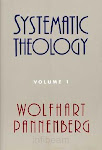This is an essay on the nature of doctrine. References are to Jaroslav Pelikan’s monographs on the development of Christian doctrine. Reference (3:241) would refer to volume 3, page 241.
1. Doctrine is “important”
2. Doctrine and mystery
3. The inadequacy of doctrine
4. The inevitability of doctrine
5. The scope of doctrine
6. “Hierarchies” of doctrine
7. The relation of words and reality
8. Liturgy as the fulfillment of doctrine
9. Love as the fulfillment of doctrine
-- -- --
Setting the Scope of Doctrine
Church fathers of the caliber of Leo have asserted that “the birth … of Christ … passes understanding,” and therefore asked “what is it that these new scrutinizers of the secrets of God suppose that they understand” (3:17; see also 3:73).
In the face of such skepticism, whether warranted or not, one is forced to ask: Whom among us and by what criteria can acknowledge the limits and proper scope of doctrine, the line “that cannot be passed”?
It is useless to go on quoting Sirach’s admonition when, indirectly, it confirms the justification of our inner compulsion to theologize. How, then, can we decide if and when articulation of a mystery is possible and to what degree?
The outcome of Luther’s consideration of predestination, among many later Lutherans, was an admonition to “keep silent about the question as a possible source of either despair or presumption” (4:219). “Reverent silence to mystery”, in this case to the mystery of the divine will, can be considered laudable. However, if Scripture (or reason) has indeed revealed something relating to this question of God’s will (or any other question), such an admonition would “defraud the faithful”, as Calvin said it did, of something necessary and useful (4:219).
Regardless of the final answer to the particular question of God’s will, “laudable silence” does imply that there exists also such a thing as “unwarranted silence” or even “dangerous silence”. Hence, we return to the truth of the inevitability of doctrine.
In the face of “a mystery that is incomprehensible until the time of revelation,” a healthier attitude is what Calvin, quoting Nicholas of Cusa, called “learned ignorance”. The “appropriate response” to mystery is neither to pry into “what the Lord has left hidden in secret,” nor on the other hand to keep silent about “what he has brought into the open,” but to “pay attention to the word of God with awe and wonder” (4:231).
In one sense this sounds like good advice. But in another sense it does not help us one bit with our question of the scope of doctrine. For in order to follow this advice we need to, first, properly locate this “mystery”, then distinguish if it truly is “left hidden in secret” or if it “has been brought into the open”, and all on the basis of the (supposedly clear) “word of God” in Scripture. For the question remains, what doctrines fall into each of these two camps?
Theologians have tried to make a list of the “too difficult questions”. Bullinger said there are three: the two natures of Christ, the fall and the origin of evil, and the mystery of the will of God in predestination (4:231). These are certainly great mysteries, but surely not even Bullinger thought Sirach’s warning absolutely forbid the contemplation of these questions, but rather just served as a certain caution against “going too far”?
But again we are begging the question and arguing in circles, for the question remains: What is too far? And on what basis?
As of yet, we have no criteria for understanding what it means to say that “of course it is impossible to pry into ‘the inner secrets of God’ himself or to understand his mysterious will” (4:331).
One thing seems to be certain. Apart from every person's right to speculate privately, everything is pointing towards the need of some form of authority to settle these questions for the church. All easy fixes, such as a naive reliance on Sirach’s admonition or on “Scripture” and their irresponsible application, simply beg the question.
If some dogmatic questions are to be “ruled out of court” or “outlawed” (2:67) as “illegitimate” for either being “offensive” or for some other reason, there must be objective criteria and a body of authority capable of implementing these criteria. The same applies for doctrines and questions that are “legitimate”.
1 month ago







No comments:
Post a Comment